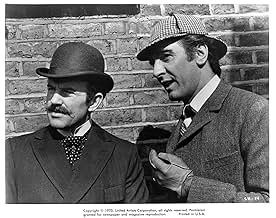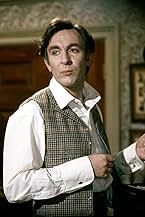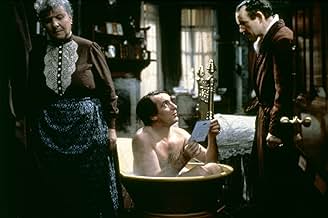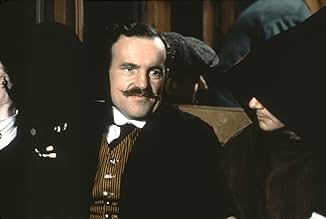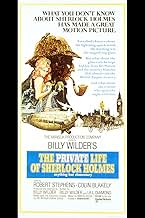La vie privée de Sherlock Holmes
Original title: The Private Life of Sherlock Holmes
- 1970
- Tous publics
- 2h 5m
IMDb RATING
7.0/10
14K
YOUR RATING
When a bored Holmes eagerly takes the case of Gabrielle Valladon after an attempt on her life, the search for her missing husband leads to Loch Ness and the legendary monster.When a bored Holmes eagerly takes the case of Gabrielle Valladon after an attempt on her life, the search for her missing husband leads to Loch Ness and the legendary monster.When a bored Holmes eagerly takes the case of Gabrielle Valladon after an attempt on her life, the search for her missing husband leads to Loch Ness and the legendary monster.
- Director
- Writers
- Stars
- Awards
- 3 nominations total
Geneviève Page
- Gabrielle Valladon
- (as Genevieve Page)
- Director
- Writers
- All cast & crew
- Production, box office & more at IMDbPro
Featured reviews
Billy Wilder's take on the world's most famous detective is both painstakingly faithful and sardonically subversive to Sir Arthur Conan Doyle's idiossyncratic creation. Presented as a case that loyal companion John Watson duly recorded but requested remain secret until long after his death, in which Holmes aids a Belgian woman find her missing husband, a mining engineer hired by an apparently non-existant English company, it makes clever use of the rulebook Conan Doyle set down while at the same time undermining it from within. The title and the plot may seem misleading at first - the first half hour especially seems at odds with what comes afterwards - but in fact if you're a Holmes fan you'll quickly realise that this is as close to romance as the detective would ever allow, and Wilder tells it through a masterful accumulation of small touches that only someone as meticulous as the man himself would notice. Script-wise, it's a cracking mystery in the best Doyle tradition, with all the time-honoured twists and turns present and correct. The acting is also up to Wilder's usual standards; Stephens and Blakely are an engaging duo as a bored Holmes and a bumbling Watson, and there's a hysterically funny supporting turn by the always underrated Revill as a Russian ballet impresario. Wilder's trademark pointed cynicism fits the English witticism particularly well, even if at times it all seems a bit too modern for the peaceful Victorian surroundings, but it is quite ironic to see him chiding Britain's stiff-upper-lip, old-fashioned morality when the film seems to be an "old timers' movie" entirely out of sync with its own time. Still, it's hard to find fault in such a thoroughly civilised and delightful entertainment.
This film is sometimes described as a comedy, and while it has humorous bits (a more sardonic and biting form of humour most of the time), it has never really felt at home being classified as a comedy, in my estimation. I do like the rapid-fire wit that Holmes seems to have here (a bit more in abundance than in the canonical Conan Doyle stories), but the Holmes presented here is a bit more dark and brooding, more akin to the extra-canonical 'Seven Percent Solution' Holmes in many ways.
Wilder was an extraordinary director and genius who sometimes gets carried away with his subject (in this regard, he is sometimes compared with Stanley Kubrick). His films are often of epic-proportions, even though they are not essentially 'epic' subjects. This film is reputed to have been nearly twice as long as the final cut version, but this may be apocryphal in that much of the raw footage never made it to final print and production. The restoration available on the disc currently available is, in fact, rather minimal - a few scenes and a few extras, but not much more than the original release of the film. This is disappointing to many fans, but in fact is more than most of us have had for a long time, as the somewhat choppy film was often mercilessly cut for television broadcast.
Holmes in this case is played by Robert Stephens, an unlikely Holmes in comparison to standards such as Rathbone, Brett, or Gillette, but still an interesting choice - quintessentially British, reserved but daring, brilliant yet flawed and faltering. Colin Blakely presents a stronger Watson than often portrayed before (this film, being made in 1970, presented this as a newer idea for Watson, one that has been picked up by many subsequent productions). Wilder has the actors play at various issues of Victorian sensibility and morality, including the implication (dismissed in the end) that Holmes might have a sexual identity issue. Christopher Lee, who himself plays Holmes in other productions, plays Holmes' smarter brother Mycroft here, to good effect.
The story line does have some inspiration from the canonical stories (the Bruce-Partington Plans, for one), and from Gillette's play (the strange case of Miss Faulkner, introducing an ending that allowed for a love interest for Holmes in the end), but for the most part takes the characters from Conan Doyle and runs far afield. Still, this is must-see film for any fan of Holmes, and any fan of Wilder, who saw this as one of his last great productions.
Wilder was an extraordinary director and genius who sometimes gets carried away with his subject (in this regard, he is sometimes compared with Stanley Kubrick). His films are often of epic-proportions, even though they are not essentially 'epic' subjects. This film is reputed to have been nearly twice as long as the final cut version, but this may be apocryphal in that much of the raw footage never made it to final print and production. The restoration available on the disc currently available is, in fact, rather minimal - a few scenes and a few extras, but not much more than the original release of the film. This is disappointing to many fans, but in fact is more than most of us have had for a long time, as the somewhat choppy film was often mercilessly cut for television broadcast.
Holmes in this case is played by Robert Stephens, an unlikely Holmes in comparison to standards such as Rathbone, Brett, or Gillette, but still an interesting choice - quintessentially British, reserved but daring, brilliant yet flawed and faltering. Colin Blakely presents a stronger Watson than often portrayed before (this film, being made in 1970, presented this as a newer idea for Watson, one that has been picked up by many subsequent productions). Wilder has the actors play at various issues of Victorian sensibility and morality, including the implication (dismissed in the end) that Holmes might have a sexual identity issue. Christopher Lee, who himself plays Holmes in other productions, plays Holmes' smarter brother Mycroft here, to good effect.
The story line does have some inspiration from the canonical stories (the Bruce-Partington Plans, for one), and from Gillette's play (the strange case of Miss Faulkner, introducing an ending that allowed for a love interest for Holmes in the end), but for the most part takes the characters from Conan Doyle and runs far afield. Still, this is must-see film for any fan of Holmes, and any fan of Wilder, who saw this as one of his last great productions.
Sherlock Holmes (Robert Stephens) and Dr. Watson (Colin Blakely) get involved in a very weird case involving a mysterious French woman (Geneuieve Page), Sherlock's brother Mycroft (Christopher Lee), midgets, Scotland, the Queen and the Loch Ness Monster! Believe it or not they all come together. I originally saw this on TV back in the late 70s but it was so heavily edited (for instance, the entire first half hour was gone because it dealt with gay characters which was still a taboo on TV back then) that I couldn't follow it and gave up. Now it's back on uncut and I'm glad I'm finally able to see it.
A very strange movie but lots of fun. Some people think this is a spoof. It really isn't but there are some very funny moments--my favorite is at the beginning when Holmes blasts Watson for how he writes about his cases--"Watson, I've never said 'elementary my dear Watson' in my life!""Poetic license Holmes". There's also quite a few funny one liners mostly delivered with great relish by Stephens and it does deal with the sexual relations of Holmes and Watson (it was hinted that they were gay lovers). But it does involve a very serious case and the jokes stop towards the end.
Stephens is actually very good as Holmes--he won't make you forget Basil Rathbone but he's not bad. Colin Blakely isn't as big a buffoon as Nigel Bruce was but he tends to overact a little. Page is just terrible as the mystery woman--but then again, English is her second language. Lee, surprisingly, is kind of stiff as Mycroft. He's a very good actor--I'm surprised to see him so bad.
The movie is very lavish (probably because Billy Wilder was involved)...a lot of money and attention was given to sets and costumes, and they actually went on location to shoot the end in Scotland. The cinematography is just beautiful and the movie was never dull. It doesn't always mix the comedy with the drama successfully but it works more often than it misses. As most people know this was HEAVILY edited before it was released and the uncut version doesn't seem to exist anymore. That's too bad but what remains is not bad. Worth catching...a must see for Holmes fans.
A very strange movie but lots of fun. Some people think this is a spoof. It really isn't but there are some very funny moments--my favorite is at the beginning when Holmes blasts Watson for how he writes about his cases--"Watson, I've never said 'elementary my dear Watson' in my life!""Poetic license Holmes". There's also quite a few funny one liners mostly delivered with great relish by Stephens and it does deal with the sexual relations of Holmes and Watson (it was hinted that they were gay lovers). But it does involve a very serious case and the jokes stop towards the end.
Stephens is actually very good as Holmes--he won't make you forget Basil Rathbone but he's not bad. Colin Blakely isn't as big a buffoon as Nigel Bruce was but he tends to overact a little. Page is just terrible as the mystery woman--but then again, English is her second language. Lee, surprisingly, is kind of stiff as Mycroft. He's a very good actor--I'm surprised to see him so bad.
The movie is very lavish (probably because Billy Wilder was involved)...a lot of money and attention was given to sets and costumes, and they actually went on location to shoot the end in Scotland. The cinematography is just beautiful and the movie was never dull. It doesn't always mix the comedy with the drama successfully but it works more often than it misses. As most people know this was HEAVILY edited before it was released and the uncut version doesn't seem to exist anymore. That's too bad but what remains is not bad. Worth catching...a must see for Holmes fans.
Billy Wilder's excellent 1970 film handles the whole subject of Sherlock Holmes from a refreshingly different angle. As the title suggests, the film is rather more concerned with characterisation than plot, which although entertaining and original, is hardly an adequate stage to show off Holmes' exceptional talents.
Instead, Wilder and Diamond start with the premise that "Watson's" stories for Strand Magazine were a little more lurid than the "reality" and use it to develop a more subtle characterisation than the "thinking machine" of the literary Holmes. Admittedly, the film probably concentrates on Holmes' celebrated cocaine habit more than it should, but all references are lifted straight from the book and in any case, Stephens does not dwell on it.
Stephens himself is quite simply excellent, giving Holmes' a depth of character not seen again until Jeremy Brett on the small screen. Stephens' performance leaves us with a slightly melancholy Holmes', a man who perhaps regrets that, unlike Watson, he has dedicated his life to pure reason and while the screenplay hints at Holmes' sexuality, Stephens deflects it masterfully, remaining ambivalent and gentile where a less accomplished actor would have been simply camp, and so uses the suggestion to wrap another layer of ambiguity about the character.
All in all, Wilder and Stephens combine to make a refreshingly accessible Holmes and the entertainment comes from the interplay of characters rather than pace of plot.
Instead, Wilder and Diamond start with the premise that "Watson's" stories for Strand Magazine were a little more lurid than the "reality" and use it to develop a more subtle characterisation than the "thinking machine" of the literary Holmes. Admittedly, the film probably concentrates on Holmes' celebrated cocaine habit more than it should, but all references are lifted straight from the book and in any case, Stephens does not dwell on it.
Stephens himself is quite simply excellent, giving Holmes' a depth of character not seen again until Jeremy Brett on the small screen. Stephens' performance leaves us with a slightly melancholy Holmes', a man who perhaps regrets that, unlike Watson, he has dedicated his life to pure reason and while the screenplay hints at Holmes' sexuality, Stephens deflects it masterfully, remaining ambivalent and gentile where a less accomplished actor would have been simply camp, and so uses the suggestion to wrap another layer of ambiguity about the character.
All in all, Wilder and Stephens combine to make a refreshingly accessible Holmes and the entertainment comes from the interplay of characters rather than pace of plot.
Sherlock Holmes is certainly one of literature's all-time most famous characters, the subject of countless novels and short stories by Sir Arthur Conan Doyle between 1887 and 1927. Since then, he has become possibly the most portrayed movie character in cinema history {according to the Guinness Book of Records, over 70 actors have played the coveted part in more than 200 films}. So rich was Conan Doyle's description of Holmes that many readers have come to think of him as a historical figure, and derive enjoyment from speculating on the finer detail's of the private detective's life. Likewise, many authors and filmmakers have decided to expand on the stories of Sherlock Holmes, creating new mysteries that perhaps Dr. John Watson forgot to publish. 'The Private Life of Sherlock Holmes (1970)' is such a tale, directed by master filmmaker Billy Wilder, who also produced and co-wrote {with long-time collaborator I.A.L. Diamond} the film.
'The Private Life of Sherlock Holmes' was originally written and filmed as a three-hour roadshow picture, an episodic compilation of Sherlock Holmes' most difficult mysteries. Unfortunately, the studio's unwillingness to take a risk with such a format meant that entire sequences, including a prologue with Watson's grandson in London, and a flashback to Holmes' university years, were inharmoniously cut from the film. Though I was initially unaware of this studio intervention, I met these findings with anger and frustration; while the surviving picture is merely a good film, Billy Wilder's original vision would certainly have been something special. I hear that at least one episode has been restored into later DVD editions of the film, but most of the missing footage remains, devastatingly, permanently absent. The story, as we now find it, is comprised of two unequal portions: the first concerns Holmes' interactions with a glamorous ballet dancer (Tamara Toumanova), casting doubt on the famous detective's sexuality, while the second mystery demonstrates the efforts of Holmes and Watson to locate the husband of an beautiful woman (Geneviève Page) suffering from amnesia.
When little-known British actor Robert Stephens first appeared on screen as Det. Sherlock Holmes, I wasn't certain that he was the suitable man for the job {Wilder had initially considered Peter O'Toole as Holmes, and Peter Sellers as Watson, before deciding to cast unknowns}. However, despite initially appearing too flamboyant to play Conan Doyle's brilliant investigator, I'm happy to say that, by the end of the film, he had well-and-truly grown on me. While Stephens didn't quite match the stories' depiction of Holmes, this is only because Dr. Watson's dramatisations often tend to embellish the truth and misrepresent facts about the detective's personality and demeanour a point that is alluded to early in the film itself. Colin Blakely, though given very little to do, is a lot of fun as Holmes' companion and biographer, playing the role a lot less serious than I've seen it done in the past. Christopher Lee also appears as Holmes' intellectually-equal brother Mycroft, whose associations with the British government may prove crucial to the case being investigated.
'The Private Life of Sherlock Holmes' was originally written and filmed as a three-hour roadshow picture, an episodic compilation of Sherlock Holmes' most difficult mysteries. Unfortunately, the studio's unwillingness to take a risk with such a format meant that entire sequences, including a prologue with Watson's grandson in London, and a flashback to Holmes' university years, were inharmoniously cut from the film. Though I was initially unaware of this studio intervention, I met these findings with anger and frustration; while the surviving picture is merely a good film, Billy Wilder's original vision would certainly have been something special. I hear that at least one episode has been restored into later DVD editions of the film, but most of the missing footage remains, devastatingly, permanently absent. The story, as we now find it, is comprised of two unequal portions: the first concerns Holmes' interactions with a glamorous ballet dancer (Tamara Toumanova), casting doubt on the famous detective's sexuality, while the second mystery demonstrates the efforts of Holmes and Watson to locate the husband of an beautiful woman (Geneviève Page) suffering from amnesia.
When little-known British actor Robert Stephens first appeared on screen as Det. Sherlock Holmes, I wasn't certain that he was the suitable man for the job {Wilder had initially considered Peter O'Toole as Holmes, and Peter Sellers as Watson, before deciding to cast unknowns}. However, despite initially appearing too flamboyant to play Conan Doyle's brilliant investigator, I'm happy to say that, by the end of the film, he had well-and-truly grown on me. While Stephens didn't quite match the stories' depiction of Holmes, this is only because Dr. Watson's dramatisations often tend to embellish the truth and misrepresent facts about the detective's personality and demeanour a point that is alluded to early in the film itself. Colin Blakely, though given very little to do, is a lot of fun as Holmes' companion and biographer, playing the role a lot less serious than I've seen it done in the past. Christopher Lee also appears as Holmes' intellectually-equal brother Mycroft, whose associations with the British government may prove crucial to the case being investigated.
Did you know
- TriviaBy the time of filming, Sir Christopher Lee had become famous as Count Dracula. When he and Billy Wilder walked on the shores of Loch Ness at dusk, with bats circling overhead, Wilder said to him, "You must feel quite at home here."
- GoofsThe events start in August 1887 and apparently take place in the following weeks or, at most, months. However, Mycroft Holmes tells Queen Victoria that Kaiser Wilhelm II had Count Zeppelin working on dirigibles that could drop bombs on Buckingham Palace. Wilhelm II did not become Kaiser until 15 June 1888, and Zeppelin did not start constructing rigid airships until the 1890s.
- Alternate versionsOriginally released at 125 minutes; the US laserdisc version adds 12 minutes of unreleased footage, including a sequence known as "The Dreadful Business of the Naked Honeymooners", featuring Jonathan Cecil and Nicole Shelby
- ConnectionsFeatured in The Many Faces of Sherlock Holmes (1985)
- SoundtracksConcerto for Violin and Orchestra Opus 24
by Miklós Rózsa
Details
- Release date
- Countries of origin
- Languages
- Also known as
- The Private Life of Sherlock Holmes
- Filming locations
- Production companies
- See more company credits at IMDbPro
Box office
- Budget
- $10,000,000 (estimated)
- Gross worldwide
- $19,930
Contribute to this page
Suggest an edit or add missing content

Top Gap
By what name was La vie privée de Sherlock Holmes (1970) officially released in India in English?
Answer

